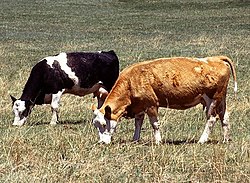Enron scandal
The economics of the Enron scandal have been a target of the "two cows" joke, often describing the accounting fraud that took place in Enron's finances. Much of the beginning of the joke when used to describe Enron resembles the following:
Enronism: You have two cows. You sell three of them to your publicly listed company, using letters of credit opened by your brother-in-law at the bank, then execute a debt/equity swap with an associated general offer so that you get all four cows back, with a tax exemption for five cows. The milk rights of the six cows are transferred via an intermediary to a Cayman Island company secretly owned by your CFO who sells the rights to all seven cows back to your listed company. The annual report says the company owns eight cows, with an option on six more. [5]
The ending of the joke varies in most interactions. An article by Bruce Sterling for the magazine Wired in 2008 had a version of the joke ending with Enron selling one cow to buy a new president of the United States, no balance sheet provided with the annual report, and ultimately the public buying Enron's bull. [6] In 2002, Power Engineering ended the joke by announcing Enron would start trading cows online using the platform COW (cows on web). [7]
